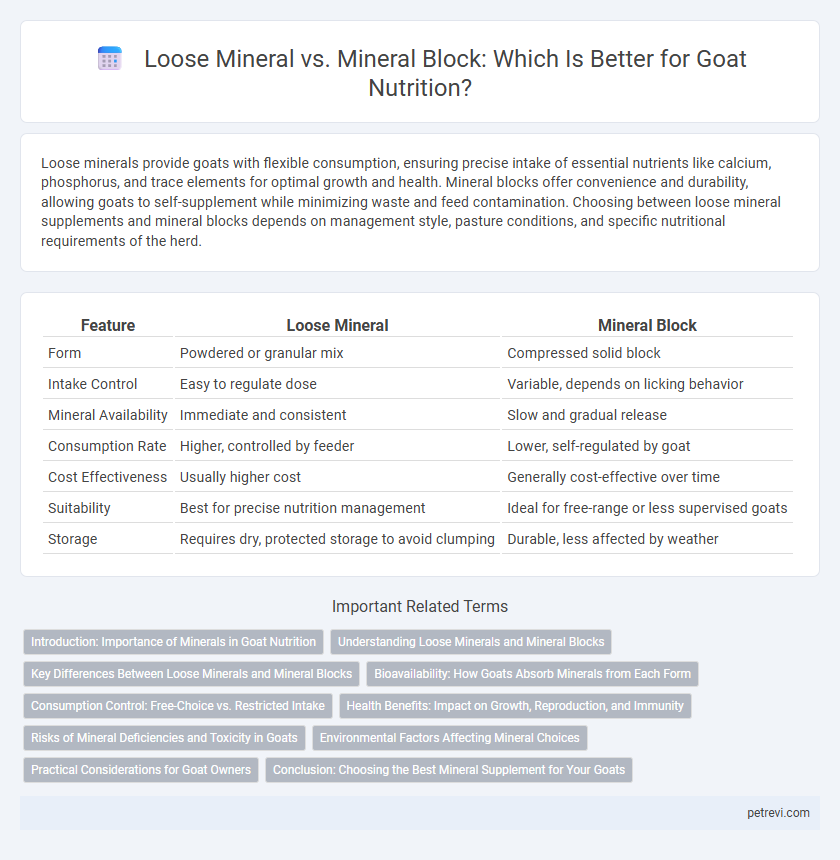Loose minerals provide goats with flexible consumption, ensuring precise intake of essential nutrients like calcium, phosphorus, and trace elements for optimal growth and health. Mineral blocks offer convenience and durability, allowing goats to self-supplement while minimizing waste and feed contamination. Choosing between loose mineral supplements and mineral blocks depends on management style, pasture conditions, and specific nutritional requirements of the herd.
Table of Comparison
| Feature | Loose Mineral | Mineral Block |
|---|---|---|
| Form | Powdered or granular mix | Compressed solid block |
| Intake Control | Easy to regulate dose | Variable, depends on licking behavior |
| Mineral Availability | Immediate and consistent | Slow and gradual release |
| Consumption Rate | Higher, controlled by feeder | Lower, self-regulated by goat |
| Cost Effectiveness | Usually higher cost | Generally cost-effective over time |
| Suitability | Best for precise nutrition management | Ideal for free-range or less supervised goats |
| Storage | Requires dry, protected storage to avoid clumping | Durable, less affected by weather |
Introduction: Importance of Minerals in Goat Nutrition
Minerals such as calcium, phosphorus, and magnesium are essential for goats, supporting bone development, reproduction, and immune function. Loose minerals offer flexibility in intake, allowing goats to self-regulate their mineral consumption based on individual needs. Mineral blocks provide a controlled, long-lasting source of nutrients, ensuring consistent availability and reducing wastage in goat nutrition management.
Understanding Loose Minerals and Mineral Blocks
Loose minerals provide goats with essential trace elements and vitamins in a free-choice form, allowing precise regulation of intake based on individual needs. Mineral blocks offer a compact, slow-release source of nutrients, promoting extended consumption periods but can limit intake control compared to loose minerals. Understanding the bioavailability and palatability differences between loose minerals and mineral blocks is critical for optimizing goat nutrition and preventing mineral deficiencies.
Key Differences Between Loose Minerals and Mineral Blocks
Loose minerals offer higher bioavailability and faster intake regulation for goats compared to mineral blocks, which provide a slower, controlled release of essential nutrients. Mineral blocks are convenient for grazing goats, ensuring continuous access, while loose minerals require careful management to prevent selective feeding and nutrient imbalance. The choice impacts mineral consumption patterns, with loose minerals supporting precise dietary adjustments and blocks promoting consistent but less flexible supplementation.
Bioavailability: How Goats Absorb Minerals from Each Form
Loose minerals offer higher bioavailability for goats as they are more easily consumed and digested, allowing for rapid absorption of essential nutrients like calcium, phosphorus, and trace elements. Mineral blocks provide a slower, more controlled intake, but goats may lick inconsistently, leading to variable mineral absorption and potential deficiencies. Optimizing goat nutrition requires balancing mineral form with intake behavior to ensure adequate and consistent mineral bioavailability.
Consumption Control: Free-Choice vs. Restricted Intake
Loose minerals offer free-choice consumption for goats, allowing them to self-regulate nutrient intake based on individual needs, which can lead to optimized health and productivity. Mineral blocks provide restricted intake as goats lick the block to obtain minerals, potentially causing inconsistent consumption and nutrient deficits if the licking behavior varies. Effective mineral supplementation requires understanding these consumption patterns to ensure goats receive adequate and balanced mineral nutrition.
Health Benefits: Impact on Growth, Reproduction, and Immunity
Loose minerals enhance goat nutrition by providing flexible intake that supports optimal growth, reproductive performance, and immune function, leading to healthier, more productive animals. Mineral blocks offer a slower, controlled release of essential nutrients, promoting long-term mineral availability but may limit precise dosage compared to loose forms. Ensuring balanced supplementation of key minerals like calcium, phosphorus, selenium, and zinc through either method directly impacts bone development, fertility rates, and disease resistance in goats.
Risks of Mineral Deficiencies and Toxicity in Goats
Loose minerals offer goats better bioavailability and intake control compared to mineral blocks, reducing the risk of deficiencies in crucial nutrients like copper, selenium, and zinc. Mineral blocks may cause inconsistent consumption, leading to either deficiency symptoms such as poor growth and reproductive issues or toxicity due to overconsumption of elements like selenium and copper. Proper balance and monitoring of mineral intake are essential to prevent metabolic disorders and ensure optimal goat health and productivity.
Environmental Factors Affecting Mineral Choices
Environmental factors such as soil mineral content, regional climate, and forage availability significantly influence the choice between loose minerals and mineral blocks for goat nutrition. Loose minerals generally offer higher bioavailability and adaptability to varying environmental conditions, promoting optimal nutrient intake in areas with fluctuating forage quality. Mineral blocks provide a convenient, low-maintenance option in stable environments but may result in inconsistent mineral consumption due to goats' variable licking behavior influenced by temperature and humidity.
Practical Considerations for Goat Owners
Loose minerals offer goats more frequent and adjustable intake, promoting better absorption of essential nutrients such as calcium, phosphorus, and trace elements. Mineral blocks provide a convenient, low-maintenance option that reduces waste and contamination, making them suitable for pasture-based systems where constant supervision is challenging. Goat owners should consider factors like herd size, feeding management, and environmental conditions to select the best supplementation method for optimal goat health and productivity.
Conclusion: Choosing the Best Mineral Supplement for Your Goats
Loose mineral supplements for goats offer higher bioavailability and easier intake regulation, promoting optimal nutrient absorption and improved herd health. Mineral blocks provide a convenient, low-maintenance option but may result in inconsistent mineral consumption and reduced effectiveness. Selecting the best mineral supplement depends on specific herd needs, feeding management style, and ensuring consistent access to essential minerals like calcium, phosphorus, and trace elements.
Loose mineral vs Mineral block for Goat nutrition Infographic

 petrevi.com
petrevi.com